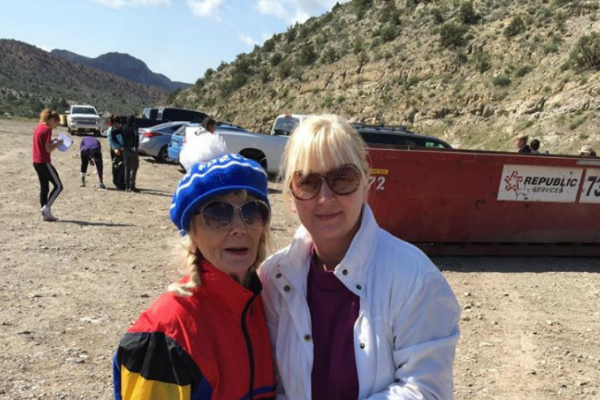Reading stories of others caring for a loved one can help you connect and relate your experience to those on a similar journey. It’s not always easy, but caregivers are both proud of their care and happy to do it. We reached out to you, real caregivers, and have collected some of your incredible journeys to share with each other to connect. This is Monica’s story.
Monica grew up the only child of Mardy, who survived the horrors of war and dictatorship in Germany and immigrated to America in 1952. Mardy became a successful costume designer, following in her father’s footsteps as a European tailor.
Throughout life, Mardy taught Monica a spirit of hard work, and that service and integrity are important character traits.

Those lessons have led Monica to pursue a career of environmental and humanitarian consulting. They also led her to be a passionate caregiver for Mardy. One day, Mardy went to see a pulmonologist for coughing fits she’d been having. She was diagnosed with pneumonia and sent home with antibiotics.
Less than a week later, Mardy started experiencing severe chest pain behind her right lung. She could not move. She went back to the hospital reluctantly, and again, tests revealed she had pneumonia.
Mardy wanted to return to work projects she’d begun at home, rather than stay at the hospital. She returned home, but as soon as her project was finished, Mardy felt a snap in her chest and had more intense pain than before.
She had fractured her rib cage – and more tests revealed she had stage four lung cancer that had spread.
“I was shocked,” Monica said. “I had not seen any signs of stages before. They told me she could go at any time, she was so weak. But she kept defying the odds.”
Monica had not heard of Kindred Hospital when Mardy was referred there to help her manage her oxygen support, improve her nutrition and gain strength. Monica’s father had battled leukemia two years before, and she became familiar with many of the healthcare facilities in the area.
“My fears were immediately erased,” Monica said. “One of the things I’ve noticed about the staff is how they communicate with seniors. Seniors want to be active and do things on their own. They don’t want to be a burden. You have to talk to them differently – it’s more than telling them they’re not a burden, that’s not enough.”
Mardy’s upbringing in Germany caused her to have anxiety about being trapped and not having enough oxygen. Monica said the care team took the time to understand what happened in Mardy’s life to cause this anxiety and develop a plan to help her breathe better.
“The attention to detail was amazing,” Monica said. “I was so grateful because no one had put these things together before. She was so active just a few weeks before the hospital, and lying in bed is tremendously annoying for her. They noticed these things and it’s helping to ease her pain and make her more comfortable.”
Monica was told Mardy would transition out of the ICU. And then, she received a call from the hospital asking her to come in when she could.
Monica’s father had received hospice care two years earlier, and her mother saw how difficult it was for him to receive treatment for so long knowing his level of illness. Mardy had made the difficult decision to transition to hospice care, and she was having trouble telling Monica on her own, so the staff at Kindred Hospital had the conversation with Monica.
“She didn’t want to be a burden on me, so I think she decided it was time,” Monica said. “The staff understood my emotions of being told that way. They held my hand while I processed all of this. They were very concerned, considerate and respectful. My mom making that decision to pass had nothing to with loving me enough to stay, but instead making the decision that they love you and have your best interests at heart.”
The hospital staff helped to transport Mardy to an inpatient hospice unit. Monica said that the staff went above and beyond simply the technical aspects and focused on truly the whole element of illness.
“Every illness has an emotional component, and they didn’t just dismiss it,” Monica said. “They understand someone’s life is at stake and what that means to family members. When you have a healthy, thoughtful conversation about the emotional part of illness – that’s healing.”
Monica said that if she could give advice to anyone in her situation, it would be that in the bigger scheme of things, the decision impacts everyone, you aren’t alone. So don’t fear reaching out for support.
“Always put yourself in their position. Think ‘If I’m my mom, what’s important to me?’ and that’s the key,” Monica said. “Just do the best you can, and that’s hard because you criticize yourself. I’m really grateful that in the end, she was in control, and she was honored and respected in the process.”
Monica began taping conversations with Mardy a few years ago, and now she has published those musings in a book called Storms in the Clouds Conversations with My Mom. She details Mardy’s remarkable journey, and how impactful she’s been in Monica’s life.
If you’re caring for a loved one, let others know your advice in the comments below. If you are looking for care options for yourself or a loved one and have questions about if Kindred can help, call 1.866.KINDRED to speak to a Registered Nurse 24 hours a day, seven days a week.